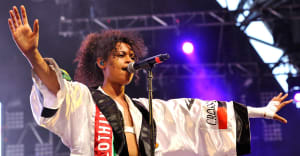It’s late afternoon at Spotify’s SXSW stage, and Aluna Francis of U.K. duo AlunaGeorge is singing over the dancehall beat of her current single “I’m In Control” while working her hips, and hitting an MPC sampler between every wine. As part of a 45-minute set that takes in tracks from the group’s debut album Body Music as well as several new songs, the London-based vocalist returns to the console several times to hit percussion or switch the beat up, with a deft dexterity to both her moves and musicianship.
The performance today is one of Aluna's first shows around her forthcoming new album with George Reid, due this summer. It follows their a leftfield EP for Tri Angle, a major label signing, and an unexpected smash last summer, when DJ Snake added a spring break bounce to their song “You Know You Like It” and took it to the Billboard top 20. Even so, the new tracks she performs at SXSW aren’t chart-friendly EDM, but fuller-fleshed incarnations of the stuttery R&B that AlunaGeorge first made their name with, such as the heartfelt “I Remember” (prod. Flume), “Heartbreak Horizon,” and “Automatic.” These latter two also incorporate acoustic instrumentation alongside the group's trademark electronic textures. The album will also feature collabs with Diplo on a couple of tracks, and potentially Swedish pop mega-producers Stargate. Backstage after the performance, Aluna talked about the new album, her new songs which strike a personal chord as never before, and how music made her stronger.
You’ve explored various sounds from your debut EP for Tri Angle, to first getting signed to a major, and now with this new record. How do you feel you’ve changed as a person in this time?
Our songs have always been about something, but now they are something more to do with me. My skills have opened up a little bit more so I can talk from my own perspective, without losing perspective. I was not really doing that so much before.
Was there a moment when you started to feel more comfortable in your own skin?
It was the third time round of writing this album. We’ve got absolutely shed-loads of songs. If they were on CDs, I could literally fill a trash can with them. We’re not precious. Just because we spend a week writing a song, that doesn’t mean it has to go on the album. The album [format] is still is the number one vessel to share a full piece of expression to our fans. There isn't anything else that's replaced it.
Even so, the fact that DJ Snake’s remix of “You Know You Like It” blew up last year shows the strength of the single as a format.
Yeah, how do you back that up? That's not what we're about. We're not here to just cash in on one track, and we're not here to get you all invested in us and then we don't make another album.
I heard you were working with Diplo and Stargate on the new album. How are those collaborations developing?
Diplo is working on either one or two tracks, and we just gotta get them finished because he is all over the shop. He's in India, he's in Thailand, he’s everywhere. I don't know if we'll get it finished in time because we have to hand this album in soon. And then, I am sitting on a couple of tracks that nobody else has heard but Stargate. We had fun; I just brought a fully written song into the session, and they were like 'err, no one does that…[but] it’s great!’ So that worked in a different way to how I normally work.
“I went through a couple of situations where I realised that even though I can take control of my musical direction, I can get into a situation where a few ingredients make me lose myself.”
Your current single “I’m in Control” could be interpreted as being about a relationship, but it’s also a neat metaphor for someone in the music industry that’s in control of their sound. What was the inspiration behind it?
Well, [the writing] started on one side of a process I was going through, and [at first] the chorus was different, and it didn’t resonate with me. I went through a couple of situations where I realized that even though I can take control of my musical direction, I can get into a situation where a few ingredients make me lose myself.
There was a personal situation where it was dangerous for me, and I had lost my ability to assert myself all along the way. I was like, ‘Why haven't I learnt these skills? Shit, I am missing something here in my personal development.' And I was like, 'Well, most of my time is spent doing music, so how can I put in something in my process that is going to help me personally?' What do I need to say to myself to keep myself in the right position?'
Do you think of the song as having a feminist message?
I think any woman who is showing positivity in the female zone can consider themselves part of the feminist movement. And if you're not helping, perhaps you can still be part of the feminist discussion. I do feel like women who are not helping the feminist cause are still relevant, because you need to look at what they're going through that makes them unable to do positive things for themselves and for other women. There's always a reason behind it. Maybe they don't have the human rights? Maybe in a situation where they're not free to make these choices.
Why did you choose to shoot the “I'm in Control” video in the Dominican Republic?
We did wanna do it in Jamaica, because I am half-Jamaican, and because of [featured artist] Popcaan—but it ended up being too expensive. It was serendipitous, because the people we met out in the D.R. were just beautiful people.
Was the video street cast?
Yeah. I wasn’t there, but the director Emil Nava was. I was like, 'You find what is beautiful about what's there. I don't wanna change anyone, let's not get hair and makeup, let's not get styling.' When I got there, he had rallied this beautiful group of people that were so chill but also fierce, and also sensitive. There was this really sweet group of boys who were looking after each other as family because some of them didn't have family. In that scene where they've all got the masks on, Emil was trying to get them to bring out a more brutish side of them, and they were just not that way with each other. They kept having their arms around each other. [Emil] was like, 'No no, push each other,' and they were like, 'Why? He didn't do nothing.'
You see with a lot of Western artists going to certain countries to shoot videos, and it can come across as appropriation. Did that play on your mind? Like, ‘let's not exoticize this?'
That's why we didn't have the dancers doing a whole heap of stuff they would never normally do. I was like, 'These girls are chill. They don't booty-wine in the street, so we're not gonna get them to do that right now.' The camera would just go in on them just like being themselves, and I think we just capture how they are as people.


